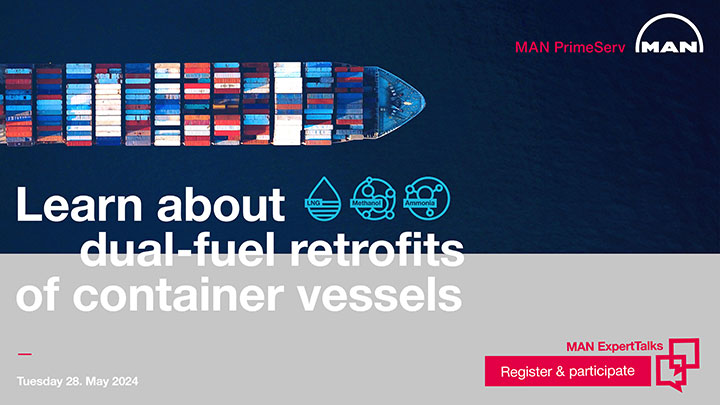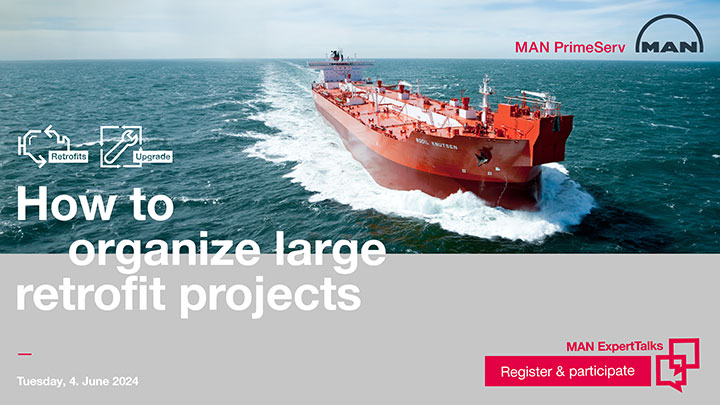What do you like to learn more about?
MAN Energy Solutions: We are moving big thing to zero
Upcoming MAN ExpertTalks
-

Marine
MAN TCT Field Test Report
MAN ExpertTalk, 09:30 – 10:15(W. Europe Standard Time)We are happy to invite you to our upcoming MAN ExpertTalk "MAN TCT Turbocharger Field Test Reports"
During this live webinar, we will present insights about the following topics:
- Field experience MAN TCT
- First inspections 2x MAN TCT40 (6.000 and 21.000 oh), 1x MAN TCT50 (5.000 oh)
- Technical advantages of this turbocharger type
- Service concept and Long Term Service Agreements (LTSA)
This MAN ExpertTalk is hosted by Ljubomir Filipovic with presentation by subject matter expert Axel Knoefel.
-

MAN PrimeServ
Learn about dual-fuel retrofits of container vessels
MAN ExpertTalk, 09:00 – 10:30(W. Europe Standard Time)Curious about the latest advancements in container vessel conversion? Interested in the green transition of shipping? Look no further!
We invite you to our upcoming MAN ExpertTalk, where we’ll delve into the fascinating world of dual-fuel retrofits for container vessels.
Our experts from MAN PrimeServ will guide you through essential topics related to dual-fuel retrofits, including the availability of alternative fuels, regulatory insights, available retrofit options, engine modifications, non-engine considerations, and real-world project experiences.
If you can’t make it to this session, don’t forget to sign up anyway as you will be provided with the webinar recording afterwards!
-

MAN PrimeServ
How to organize large retrofit projects
MAN ExpertTalk, 09:00 – 10:00(W. Europe Standard Time)If you're passionate about driving innovation in the maritime industry and curious about tackling large retrofit projects to contribute to de-carbonization efforts, this session is for you!
Discover our approach to retrofit strategies, including transitioning to new alternative fuels, and gain understanding how we navigate the complexities of large retrofit projects. Further our experts will go into detail about our collaborative efforts with repair yards and vessel owners to ensure seamless project execution. Additionally, you get an exclusive peek at the list of currently qualified and preferred repair yards in the market.
We look forward to seeing you there!
Even if you can’t make it to the live session, make sure to sign up anyway! We’ll send you the webinar recording afterwards, so you won’t miss out on valuable insights.
Latest news
Study Shows Competitive Green-Hydrogen Production Possible in Northern Germany
MAN Energy Solutions and the Fraunhofer Institute for Surface Engineering and Thin Films (IST) have published their analysis of the framework conditions for the future supply of green hydrogen to the Salzgitter steel site near Hannover. Commissioned by Hydrogen Campus Salzgitter, the study investigates, among other questions, the role locally produced green hydrogen could play to support German supply and its potential competitiveness with imports.
The study’s calculations show that – if used directly without further conversion – local hydrogen can be economical and even cheaper than imports from 2030 onwards. While production costs of around 4.00 euros per kilogram are possible in northern Germany, hydrogen imported from Tunisia, for example, would cost at least 4.70 euros to produce – profit margins in both cases not included.
Marc Grünewald, Head of Business Development, Power and New Energies at MAN Energy Solutions, said: "In the case of direct use, local hydrogen has an economic advantage due to the elimination of transport and conversion costs. As such, green hydrogen can be produced in northern Germany at competitive prices and form the basis for a German hydrogen initiative – this is good news for German industry."
For the study, the authors modelled different supply chains for green hydrogen and compared possible import routes, such as those from Portugal, Canada, Tunisia and Australia. Although green hydrogen can be produced much more cheaply in countries with significant amounts of sunshine, it must then be converted for transport to Germany and subsequently back again for domestic use. This process step, which is fraught with costs and losses, drives the total expense above the cost price of H2 produced from wind energy in northern Germany, which can be transported by pipeline to its destination for immediate use.
Grünewald added: "Of course, we will still need imported hydrogen, and in large quantities, for two reasons. Firstly, due to the limited wind-energy potential in Germany, we can only cover a fraction of the prospective demand from domestic sources. Secondly, the local cost-advantage disappears the moment the hydrogen is not for direct use but rather as a raw material for synthetic fuels such as ammonia, methanol or methane. This will be the case in many instances, as for example in the shipbuilding or aviation industries. Accordingly, in addition to domestic production, we also need strong, international partners and import routes from the sunny or windy regions of North Africa, Patagonia, Scotland and Canada."
Due to its low energy-density and high volatility, pure hydrogen cannot yet be transported economically over longer distances, while ports possess neither tanker fleets nor appropriate infrastructure. Experts therefore assume that international transport will initially scale up via conversion to more conveniently transportable media, such as methanol, ammonia, etc.
Due to low technological maturity and lack of infrastructure, the study by MAN Energy Solutions and IST did not consider liquefied hydrogen or so-called LOHCs (Liquid Organic Hydrogen Carriers) in its analysis.
"These technologies may play a role after 2030 but it’s too early to tell," Grünewald said. Converting hydrogen into ammonia, methane or methanol, however, would quickly entertain large-scale import scenarios. "The world needs a massive amount of industrially-scaled, green hydrogen production. This study shows that Germany can also play an important part in building this supply."
Study only available in German Language. Please find the link here: Hydrogen Study
Documents
-
MAN ES_PM_Studie_Salzgitter_EN
Contact
Jan Hoppe
Head of Group Communication & Marketing
Group Communications & MarketingMAN Energy Solutions SEStadtbachstr. 186153 AugsburgGermany
Jan.Hoppe@man-es.com t +49 821 322 3126Available languages
- DE ·
- EN
